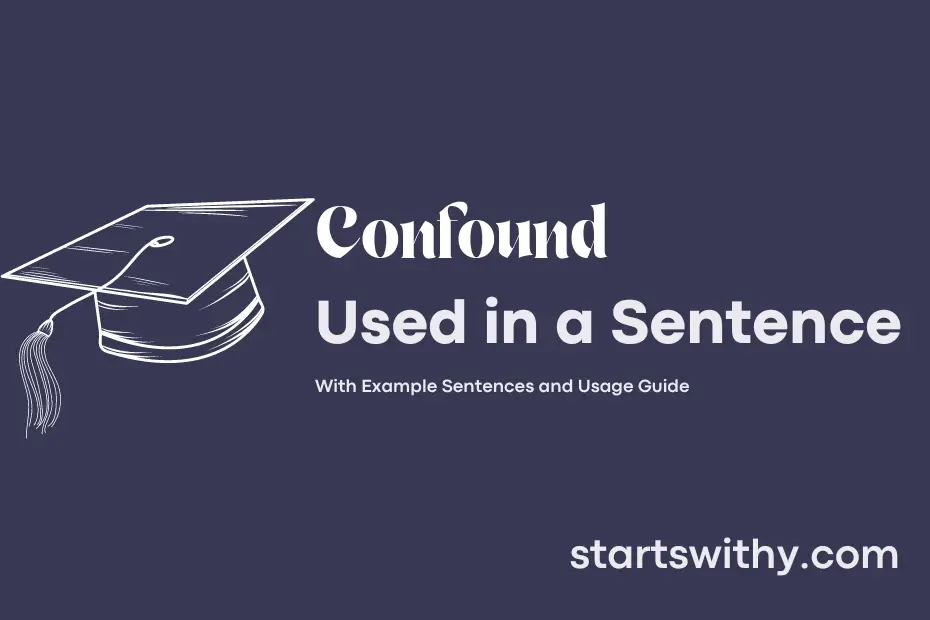Ever been puzzled by a sentence that seemed to make no sense? Welcome to the world of confusion, where words can confound even the most adept readers. To confound means to bewilder or perplex, leaving you scratching your head in search of clarity.
When a sentence seems to defy logic or reason, it has the power to confound not just the reader, but also the writer. Whether it’s a complex idea expressed in a convoluted manner or a series of words that just don’t seem to fit together, examples of sentences that confound can be both frustrating and fascinating.
7 Examples Of Confound Used In a Sentence For Kids
- The magic trick seemed to confound the audience.
- The tricky riddle managed to confound all the children.
- The maze was designed to confound anyone who entered.
- The unexpected rain shower seemed to confound everyone at the picnic.
- The loud thunderstorm noise managed to confound the sleeping puppy.
- The teacher’s difficult question appeared to confound the students.
- The new puzzle game was able to confound even the most experienced players.
14 Sentences with Confound Examples
- Confound by the complex equations in the calculus class, the students sought the teacher’s help.
- In the chemistry lab, the experiment’s unexpected results confounded the group of students.
- The new academic policies have confounded many students, causing confusion and doubts.
- Confound by the sudden change in the timetable, the students struggled to adjust their study schedules.
- The challenging essay topic confounded many students, leading to procrastination and writer’s block.
- The increase in tuition fees has confounded students, forcing them to find alternative sources of funding.
- The professor’s cryptic comments confounded the students, leaving them puzzled about the lecture’s main points.
- Confound by the diverse cultural perspectives in the class, students engaged in meaningful discussions and debates.
- The limited resources available at the library confounded students during exam season.
- The conflicting study tips given by different seniors confounded the new students, making it difficult for them to plan their study routines.
- The unexpected group project pairing confounded the students, pushing them out of their comfort zones.
- Sonali’s surprising performance in the debate competition confounded her classmates and brought her unexpected accolades.
- The technical issues with the online examination platform confounded students during their mid-term tests.
- The dense academic language of the research paper confounded many students, prompting them to seek clarification from the professor.
How To Use Confound in Sentences?
To use the word Confound in a sentence, begin by understanding its meaning. Confound means to cause confusion or bewilderment.
When constructing a sentence with Confound, identify the subject that is causing the confusion and the person or thing that is being confused. For example, “The complex instructions confound me.” In this sentence, the subject is the complex instructions, and the person being confused is “me.”
It is important to note that Confound is typically used in formal or academic writing to convey a sense of perplexity or puzzlement. For instance, “The results of the study confounded the researchers.”
When using Confound in a sentence, consider the context in which it is being used. Ensure that it accurately captures the idea of confusion or perplexity that you intend to convey.
Remember that Confound is a strong verb that implies a level of confusion beyond mere surprise or misunderstanding. It is best suited for situations where there is a significant level of complexity or uncertainty.
By following these guidelines and examples, you can effectively incorporate the word Confound into your writing to convey a sense of puzzlement or confusion with confidence.
Conclusion
In conclusion, sentences using the word “confound” often illustrate situations where something unexpected or surprising happens, causing confusion or disbelief. These sentences typically showcase instances where a result or outcome defies expectations, causing a mix of astonishment and perplexity. Whether in a scientific experiment, a social interaction, or a personal anecdote, sentences with “confound” highlight the complexity and unpredictability of life.
By exploring these diverse examples of sentences with “confound,” we gain a better understanding of how the word is used to describe perplexing and unexpected situations. It reminds us that life is full of surprises and challenges that can confound even the most prepared individual, adding an element of uncertainty and mystery to our everyday experiences.



